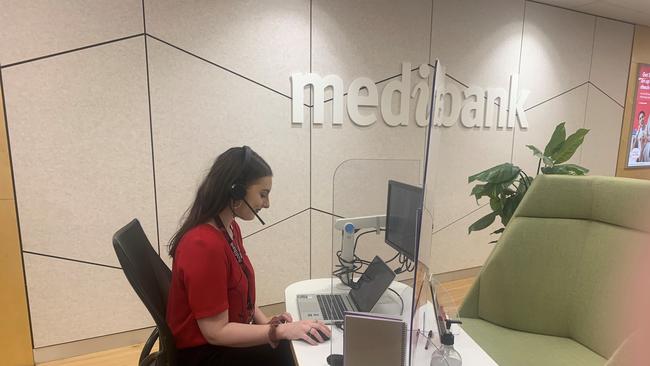Medibank trials ‘geofence’ amid four-day work week experiment as it goes all out on making staff – and customers – happy
Call centre staff living in the same city as their customers will take calls about a range of health issues as part of a new localised work model as Medibank rebounds from last year’s cyber attack.
Australia’s biggest health insurer Medibank has joined Amazon in embracing hyper-localisation as a way to bolster earnings and win customer satisfaction.
Medibank has begun trialling a new geofence in its customer service centre that allows staff to take calls from customers living in the same region in an effort to better service their health needs by tapping into local knowledge.
Amazon has slashed the time it takes for products to travel from its fulfilment centres after it launched a “regionalisation model” as part of an overhaul of its global operations. This means opening more regional warehouses that stock more of the items that customers living nearby are likely to buy, speeding up delivery times.
Medibank is studying several new work models as it recovers from last year’s cyber attack, which involved Russian hackers stealing and publishing customer health records and other sensitive information – such as pregnancy terminations and mental health conditions – on the dark web.
Other initiatives include a four-day working week with no loss in pay, which began last month. For the geofence trial it has adopted what is known as “triple-level routing”, which separates calls into local, state and national levels, routing them to a “local hub”. This could be the closest Medibank store or state-based call centre.
Medibank chief customer officer Milosh Milisavljevic said it aimed to make navigating Australia’s “complex” health system easier, given that each state has different systems and policies.
“We receive thousands of calls and online messages every day, so this trial will see whether providing a localised service delivers better outcomes for our customers,” he said.
“We’re already seeing a fantastic response from customers who are surprised to hear they are speaking with someone who lives in the area and knows the local hospitals and health professionals.”
Crucially, it aims to lift customer satisfaction, with Mr Milisavljevic noting some improvement.
Customer satisfaction dived after Russian cyber criminals hacked into the insurer’s customer database of almost 10 million policyholders late last year, leaving the company with a clean-up bill of up to $150m, as well as several customer and investor class actions.
Net promoter score, a measure of customer satisfaction, fell 5.2 points to 40.1 in the year to June 30. Medibank has since revamped its senior leadership, including creating a new data management executive role and “dedicated customer trust team”.
It will trial the geofence technology in Geelong, Victoria’s second-biggest city, and South Australia. Geelong has been selected to study how the geofence will work on a city-based level, while South Australia will look out the effectiveness of localising state-based operations.
All calls from the Geelong region will be routed to Medibank’s Geelong retail store, whereas all calls originating in South Australia will be diverted to Adelaide stores. If the call cannot be answered within a “suitable time” it is then diverted to the national call centre.

Medibank Geelong store manager, Tracy Fisher, said the trial has so far made her job more enjoyable.
“Even though the trial has been only going for three months, I already feel more connected to the community. When a customer call comes through, they aren’t a number in the queue, they’re someone who might walk into the store tomorrow,” Ms Fisher said.
“We’re also noticing a huge improvement in the conversations that we’re having with customers when we tell them that we work at the local store and that we know the local dentist or physio.”
Medibank employs around 700 frontline employees, including contact centre employees and retail store employees, and has been training staff to take on more customer queries. Medibank does not have a traditional call centre – all call centre employees have the flexibility to either work from home or a local store.
Previously, contact centre employees were trained in specific areas, such as claims, service and cover review. Like Amazon speeding up delivery times, Medibank envisages the new model will reduce transfers to different departments and improve the customer experience.
Amazon, which opened a $70m fulfilment centre at Jandakot in Perth last week, has been rolling out its regionalisation model across its global operations. In the US, 76 per cent of orders now come from a customer’s region, which has reduced travel distances by 15 per cent and a more than 12 per cent decrease in “touches,” or how often a package is handled
Sarah Mathew, Amazon’s director of delivery experience, said the “benefit for us and for the environment is that we can do it with fewer emissions”.
“The second component of increasing our speed is inventory placement. So regionalisation is great, but if you’re sitting in Seattle and you can’t get laundry detergent, you’re not going to shop in our stores. And so we’ve taken our data, and we use machine learning and AI to optimise inventory to ensure that we have the right inventory in the right locations to satisfy the customer demand.”
In Australia, Amazon can deliver items to 80 per cent of the population from its Sydney fulfilment centre within 12 hours. But the opening of the new centre in Perth means less time travelling across the Nullabor.
The Perth warehouse’s total floor area is about 20,000 square metres – around the same size as the WACA – allowing Amazon to increase the proportion of items that can be shipped directly to Western Australian customers by 500 per cent.






To join the conversation, please log in. Don't have an account? Register
Join the conversation, you are commenting as Logout